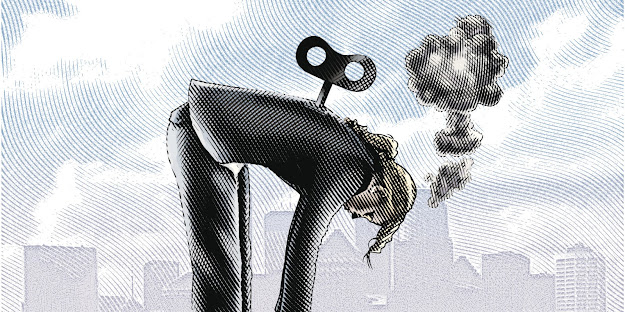WORK : ''' '' SIX
HOURS SIP '' '''
! THE TRUTH ! : IN THE WORLD - IN THE DEVELOPING WORLD : Most humans, most students spend a life of quiet desperation. Agreed. And you? For sure, Henry David Thoreau would have made this master point.
THE FUTURE OF WORK SHOULD MEAN : Working Less.
WE SHOULD LOOK FOR PURPOSE BEYOND our jobs and then fill work in around it. We each have limitless potential, a unique ''genius,'' as Henry David Thoreau called it.
He believed that excessive toil had stunted the spiritual growth of the men who laid the railroad near Walden Pond, where he lived from 1845-1847. He saw the pride they took in their work but wrote, '' I wish, as you are brothers of mine, that you could have spent your time better than digging in this dirt.''
WRITING IN 1891, Pope Leo XIII argued that working conditions, including hours, should be adapted to ''the health and the strength of the workman.''
Since each of us is both dignified and fragile, our new vision should prioritize our compassion for workers, in light of work's power to deform their bodies, minds and souls.
As Eyal Press argues in her new book, ''Dirty Work,'' people who work in prisons, slaughterhouses and oil fields often suffer moral injury, including post-traumatic stress disorder, on the job. This reality challenges the notion that all work builds character.
Wage labour can harm us in subtle and insidious ways, too. The American ideal of a good life earned through work is ''disciplinary,'' according to the Marxist feminist political philosopher Kathi Weeks, a professor at Duke and often cited critic of the modern work ethic.
''It constructs docile subjects,'' she wrote in her 2011 book, ''The Problem With Work.'' Day to day, that means we feel pressure to become the people our bosses, colleagues, clients and customers wants us to be. When that pressure conflicts with our human needs and well being, we can fall into burnout and despair.
To limit work's negative moral effects on people, we should set harder limits on working hours. Dr. Weeks calls for six-hour workday with no pay reduction. And we who demand labor from others ought to expect a bit less people whose job grands them down.
In recent years, the public has become more aware of conditions in warehouses and the gig economy. Yet we have relied on inventory pickers and delivery drivers ever more during the pandemic.
Maybe compassion can lead us to realize that we don't need instant delivery of everything and that workers bear the often invisible cost of our cheap meat and oil.
The vision of less work must also encompass more leisure, For a time the pandemic took away countless activities, from dinner parties and concerts to in-person civic meetings and religious worship. Once they can be enjoyed safely, we ought to reclaim them as what life is primarily about, where we are fully ourselves and aspire to transcendence.
Leisure is what we do for its own sake. It serves no higher end. Patricia said that making art is often ''meditative'' for her. ''If I am trying to draw a plant, I'm really looking at the plant,'' she said.
''I'm noticing all the different shades of color that maybe I wouldn't have noticed if I wasn't drawing it.'' Her absorption in the task - the feel of the pen on paper - ''puts the pain out of focus.''
It's true that people often find their jobs meaningful, as Partricia did in her academic career or as I did while working on this essay. But for decades, business leaders have taken this truth too far, preaching that we'' find the purpose of our lives at work.
It's a convenient narrative for employers, but look at what we actually do all day : For too many of us, if we aren't breaking our bodies, then we are drowning in trivial email. This is not the purpose of human life.
And for those of us fortunate enough to have jobs that consistently provide us with meaning - but anything from a sudden health issue to the natural effects of aging to changing economic conditions can leave us unemployed.
Pursuing our genius, whether in art or conversations or sparring at a jujutsu gym, will awaken us to ''a higher life than we fell asleep from,'' Thoreau wrote. It isn't the sort of leisure, like culinary tourism, that heaps more labor on others.
It is leisure that allows us to escape the normal passage of time without traveling a mile.
The mornings Thoreau spent standing in his cabin doorway, ''rapt in a revery'', he wrote, ''were not time subtracted from my life, but so much over and above my usual allowance.'' Compared with that, he thought labor was time wasted.
The Honor and Serving of the Latest Global Operational Research on Work, Times and Future, continues. The World Students Society thanks author Jonathan Malesic, a writer and a former academic, sushi chef and a parking lot attendant who holds a Ph.D in religious studies.
He is the author of the forthcoming book ''The End of Burnout,'' from which this essay is adapted.
With respectful dedication to the Toiling Masses, Mankind, Students, Professors and Teachers of the world. See Ya all prepare and register for Great Global Elections on The World Students Society : wssciw.blogspot.com and Twitter - !E-WOW! - The Ecosystem 2011 :
Good Night and God Bless

.png)


0 comments:
Post a Comment
Grace A Comment!